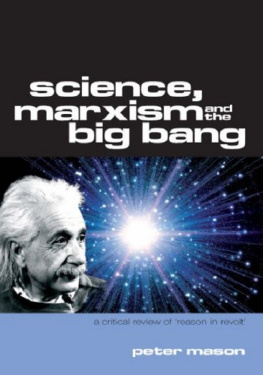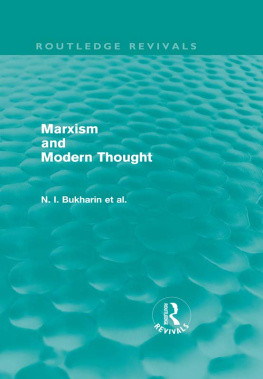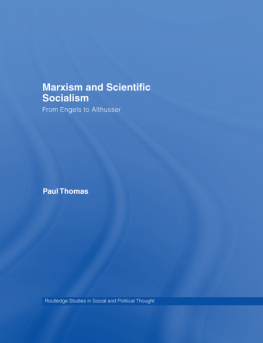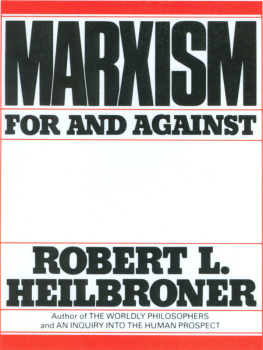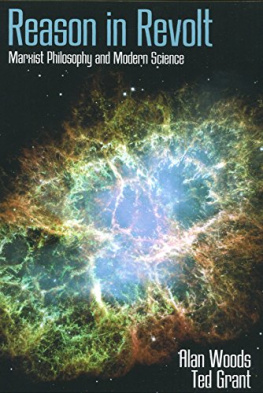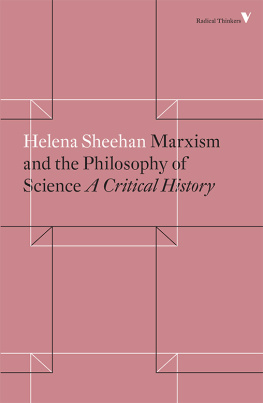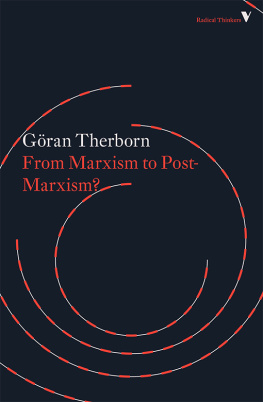Peter Mason - Science, Marxism and the Big Bang: A Critical Review of Reason in Revolt
Here you can read online Peter Mason - Science, Marxism and the Big Bang: A Critical Review of Reason in Revolt full text of the book (entire story) in english for free. Download pdf and epub, get meaning, cover and reviews about this ebook. year: 2021, publisher: Socialist Books, genre: Romance novel. Description of the work, (preface) as well as reviews are available. Best literature library LitArk.com created for fans of good reading and offers a wide selection of genres:
Romance novel
Science fiction
Adventure
Detective
Science
History
Home and family
Prose
Art
Politics
Computer
Non-fiction
Religion
Business
Children
Humor
Choose a favorite category and find really read worthwhile books. Enjoy immersion in the world of imagination, feel the emotions of the characters or learn something new for yourself, make an fascinating discovery.
- Book:Science, Marxism and the Big Bang: A Critical Review of Reason in Revolt
- Author:
- Publisher:Socialist Books
- Genre:
- Year:2021
- Rating:3 / 5
- Favourites:Add to favourites
- Your mark:
Science, Marxism and the Big Bang: A Critical Review of Reason in Revolt: summary, description and annotation
We offer to read an annotation, description, summary or preface (depends on what the author of the book "Science, Marxism and the Big Bang: A Critical Review of Reason in Revolt" wrote himself). If you haven't found the necessary information about the book — write in the comments, we will try to find it.
This title argues that Alan Woods and Ted Grants Reason in Revolt misunderstands science and misrepresents Marxism and its philosophy of dialectical materialism.
from Amazon.com:
The book is a reply to Reason in Revolt by Alan Woods and Ted Grant, published in 1995. Their book has been useful in providing a foil against which Pete Mason has produced a very useful introduction to Marxism in relation to science and to its real method.
Pete outlines the development of philosophy, from the ancient Greeks through to dialectical materialism, and further, provides an exposition of the relationship of Marxism to scientific discovery.
The arrogant stance of Reason in Revolt is far from helpful. The cover blurb poses the question: will this encounter between Marxist philosophy and science provide the basis for a new and exciting breakthrough in the methodology of science?
Scientists, if not indifferent to Marxism, would not welcome such high-handed philosophical meddling, and therefore could see this as an unnecessary intervention into the existing scientific method.
Pete Mason makes clear that Marxism is not a substitute for science. This does not mean that Marxism is not a science, or an adjunct of science, nor a question of Marxism versus science!
Marxism reveals science not just as a theoretical, but importantly as a human and social activity: that science is not something for itself, but a very crucial part of economic and social development.
Through the method of dialectical materialism we have a way of judging the probable development of future trends in advance of other thinkers. But Marxism is certainly not a dogma where the lines of social and economic development of humankind will have been pre-ordained. This is a complete distortion.
The method of Marxism emphasises the impossibility of doing this. Marxisms value lies in its method as a guide to action, not as a creed or a cosmogony a theory of the origin and development of the universe.
Examining any particular historical stage we can discern the necessity of the development of certain forms as an outcome from the contradictions of some previous state
These contradictions are of inestimable importance to science, because out of the struggle to solve them emerges some unpredictable and novel discoveries, raising further and formerly unsuspected problems.
Marxists can foresee processes that are ongoing and unfolding and have no need to declare for either the eternal (and infinite!) existence of a universe essentially like ours, nor a single primordial origin.
Peter Mason: author's other books
Who wrote Science, Marxism and the Big Bang: A Critical Review of Reason in Revolt? Find out the surname, the name of the author of the book and a list of all author's works by series.

